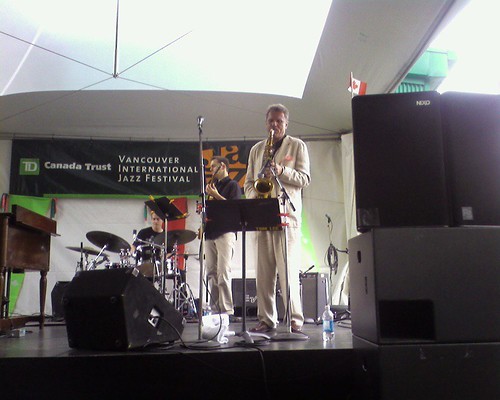WWOZ
| I've ranted on at some lenghth in various internet spaces (particularly the discussion board at my host website, http://www.vancouverjazz.com ) about the dearth of "jazz media," particularly press and radio, in today's world. The city of Vancouver, Canada stands as a pretty good example of the sorts of things that can happen when artists are deprived of the essential structures for bringing their art to the public. Some of the best jazz musicians I've ever heard or worked with live in Vancouver. Yet the city (which is home to 2.2 million people and is a major international tourist destination) has only one functioning jazz club http://www.cellarjazz.com/ . There is no jazz radio station, and no publications of any kind devoted to jazz music. I recently played two gigs at the city's jazz festival http://www.coastaljazz.ca/ , an event with an international profile. Yet scouring local press coverage of the event, I was left with the impression than local participation was minimal at best. It's as if the city (which trumpets itself in other areas, endlessly, as "world class") had gone from jumped up lumber town to sterile, soul-less megalopolis without passing through civilization in between. The sad thing is that Vancouver will never, ever be truly "world class" until it starts recognizing and honoring it's own artists. New Orleans is far from perfect in this regard, but it's head and shoulders above anywhere else I've ever lived. I led my own jazz ensembles for ten years in Vancouver, and played the local festival every year for five, yet I was never able to get the local arts weekly (The Georgia Straight) to so much as return a phone call. Four months after moving to New Orleans, in January 2004, Offbeat magazine gave my CD "One Up, Two Back" (which I'd never managed to get reviewed in my 'home town' of Vancouver) a terrific review. Local media in New Orleans actually believe supporting local music is part of their mandate. That's especially true of local community radio station WWOZ http://www.wwoz.org/ . 'OZ doesn't play all local music, but they play an awful lot, and if you're a local musician with a professional quality CD, they will play it. That's what they're there for. No arm twisting necessary. And because their signal is available around the world on the internet, they are an integral part of helping New Orleans musicians develop international careers. The New Orleans 'brand' is nothing to sneeze at, especially in Europe, where it's worth serious money. 'OZ also has a wonderfull collection on it's site of local cultural documentaries, called "Street Talk," one of which ("Fruit Vendor") I linked to in my previous post, "Mr. Arthur." The access to press, radio, and reliable local and internet record distribution (through local record store the Louisiana Music Factory http://www.louisianamusicfactory.com/ ) creates a synergistic field which gives musicians a real shot at getting some attention in the larger world. The almost total lack of attention given Vancouver jazz musicians by their local media would be inconceivable here. |


